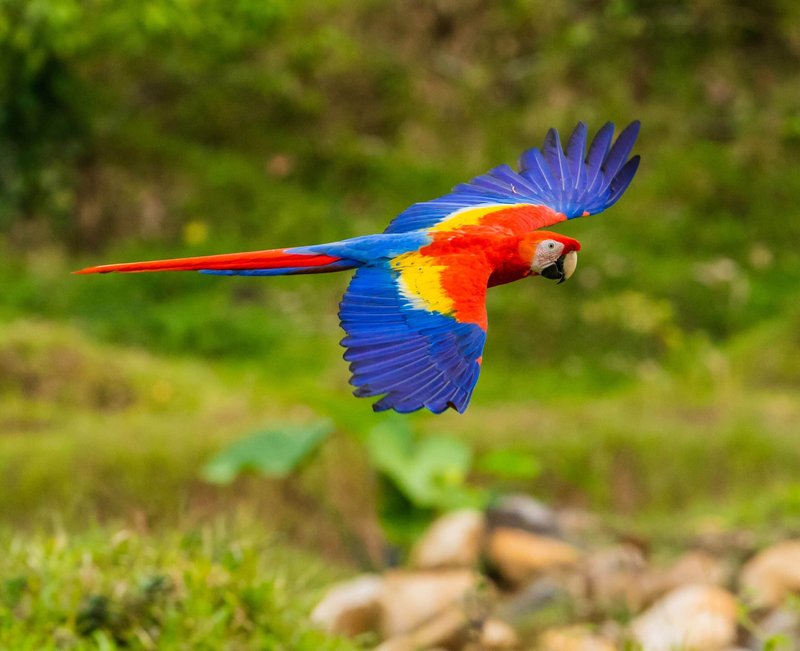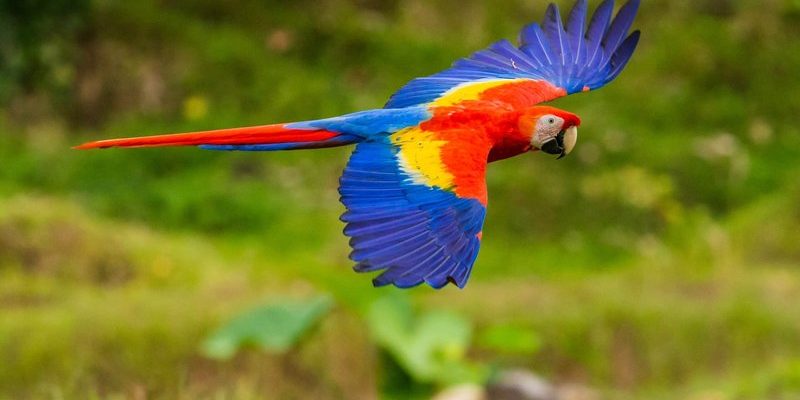
Macaws are part of the parrot family, known for their intelligence and social nature. They’re often seen in pairs or small groups, showcasing their playful antics and harmonious calls. In this article, we’ll dive deep into the world of macaws and uncover ten interesting facts that show just how special these birds are. So, grab a cup of coffee, get comfy, and let’s explore the vibrant world of macaws together!
1. Macaws Are Incredibly Colorful
You can’t talk about macaws without mentioning their breathtaking colors. These birds are like living rainbows! The most common species, the blue-and-yellow macaw, sports bright yellow underparts and a stunning blue back and wings. Other species, like the scarlet macaw, flaunt fiery red feathers mixed with yellow and blue.
Honestly, their vibrant colors serve more than just a decorative purpose. They help in camouflage among the leaves and flowers of their natural habitats. When they’re perched among tropical plants, it’s a bit harder for predators to spot them. Their colors also play a role in social interactions, helping them communicate and attract mates.
2. They Have Strong Beaks for Cracking Nuts
Macaws possess some of the strongest beaks in the bird family. With their robust, curved beaks, they’re masters at cracking open tough nuts and seeds. You might be wondering why such a powerful beak is necessary. Well, in the wild, macaws often feast on hard-shelled fruits and nuts, which are packed with nutrients.
Their beaks are not just for eating, though. They use them for climbing and manipulating objects. Just picture a macaw hanging upside down, munching on a nut while expertly balancing on a thin branch. Their beaks are vital tools for their survival in the wild.
3. Macaws Are Highly Intelligent
If you think all birds are just winged creatures that chirp, think again! Macaws are known for their exceptional intelligence. They rank among the smartest of all birds, capable of solving complex problems and adapting to new situations. Some studies suggest that their intelligence is comparable to that of a young child!
Let me explain: macaws can learn to mimic human speech and use simple tools. Imagine a macaw picking up a stick to help reach a snack or repeating a phrase it hears frequently. This intelligence makes them incredibly engaging pets, although it also means they require mental stimulation to stay happy and healthy.
4. They Can Live a Long Time
When it comes to lifespans, macaws are among the longest-living birds. With proper care, many macaw species can live between 30 to 50 years, with some reaching even older ages! This longevity is part of what makes them such a long-term commitment for pet owners.
Thinking about adopting a macaw? Get ready for some serious dedication. You’ll want to ensure a stimulating environment and a proper diet to keep these feathered friends happy throughout their many years. Just like any meaningful relationship, it’s about being there for them through thick and thin.
5. Their Social Structures Are Fascinating
Macaws are incredibly social creatures. In the wild, they often live in flocks that can number up to 30 birds. These flocks provide companionship and safety in numbers. Young macaws learn important skills from their parents and peers, like foraging and navigation.
Beyond survival, their social interactions are entertaining. They engage in playful displays, preen each other’s feathers, and communicate through vocalizations. You might find it incredible how affectionate and bonded macaws can be, both with their flock and human companions.
6. They Have Unique Calls
Have you ever heard a macaw call? Their sounds can range from loud squawks to melodic whistles, making them some of the most vocal birds out there. These calls serve various purposes, including communication within their flock and signaling danger.
Their loud calls can be heard from miles away, which isn’t great if you’re looking for peace and quiet! However, their vocal abilities also make them fascinating companions. Some people even train their macaws to mimic phrases or sounds, adding an interactive twist to their personality.
7. Macaws Are Herbivores
You might be surprised to learn that macaws are mostly herbivores. Their diet mainly consists of fruits, nuts, seeds, and flowers. This plant-based diet provides them with the nutrients they need, including vitamins and minerals.
It’s essential to provide a balanced diet for pet macaws, incorporating a variety of foods to keep them healthy. Think about it like cooking a colorful dish—just like you wouldn’t want to eat the same thing every day, neither do they! A good mix helps keep them energetic and vibrant.
8. They Face Habitat Loss
Sadly, macaws are facing challenges in the wild. Habitat destruction due to logging, agriculture, and urban development poses a significant threat to their populations. Many species of macaws are now considered vulnerable or endangered.
Conserving their habitats is crucial for their survival. Organizations and individuals are working hard to protect these stunning birds and their environments. By raising awareness and supporting conservation efforts, we can help ensure that future generations get to enjoy the beauty of macaws.
9. Macaws Can Be Great Pets
If you’re considering bringing a macaw into your home, it’s essential to know what you’re getting into. They can make fantastic pets, but they require a lot of care, attention, and mental stimulation. Due to their social nature, they thrive on interaction, so expect to spend quality time with them daily.
Here’s the thing: owning a macaw isn’t just about having a pretty bird around. They can be demanding pets, needing plenty of toys, mental challenges, and socialization. But if you’re up for the challenge, their loving personalities can bring immense joy to your life.
10. Macaws Are Symbolic in Different Cultures
Throughout history, macaws have held significant cultural meanings in various societies. In many Indigenous cultures of South America, they symbolize beauty, love, and freedom. Their striking colors and playful behavior have made them beloved subjects in art, folklore, and even mythology.
You might find it fascinating how these birds connect people across different cultures and generations. Their presence often inspires admiration and respect for the natural world, reminding us of the rich biodiversity we share our planet with.
In conclusion, macaws are so much more than colorful birds. They embody intelligence, social complexity, and vibrant beauty. Whether you’re a bird enthusiast or simply curious about wildlife, macaws inspire wonder and appreciation. By learning about their behaviors and challenges, we can do our part to protect these magnificent creatures and ensure that they continue to thrive in the wild and as cherished companions.

